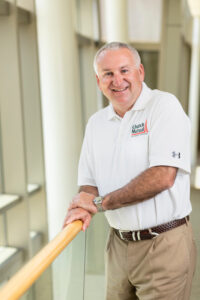
With 41% of Americans reporting symptoms of depression or anxiety attributed to the COVID-19 pandemic, it’s no wonder religious leaders also are feeling more stressed than ever before.

President and CEO
Church Mutual Insurance Company, S.I.
Many of you are facing heightened needs from your members and the community while also managing personal stressors — balancing family needs, financial concerns and an increasing workload while continuing to provide your congregation with the services they need and expect, but in different ways.
Houses of worship also have some unique challenges. Many were forced to rapidly transition from gathering members face-to-face, the pre-pandemic norm, to online services. This swift change was so challenging, according to recent research, 30% of pastors said they were worried about being able to connect with their congregation.
In this environment, we all are seeking guidance on how to handle the changing dynamics of our lives while maintaining a healthy balance. As a leader of an organization that supports houses of worship, I will admit the pandemic has taken a toll on my own emotional health and motivated me to make positive changes in my daily habits. Faith leaders, you also need to prioritize your own emotional, physical and mental health. You must be healthy and well to serve others who need you more than ever.
Start by modeling the importance of self-care. Here are a few helpful tips:
Embrace mindfulness.
As busy as you are, find time each day to center yourself through prayer, meditation and other forms of mindfulness. Nourishing your own spiritual life is a powerful way to lead others. If you haven’t done so already, you might want to explore the wide variety of phone apps for self-centering that can supplement your faith-based practices.
Talk openly about counseling and therapy resources.
Whether it’s during a weekly Sunday service or a church leadership staff meeting, talking openly about therapy and counseling is a healthy way to encourage individuals to seek help when they need it. Religious leaders have the ability to encourage people to receive care for their physical health, and the same should be true for emotional and mental health. Consider sharing your own experience with therapy or simply make a point to speak frequently and clearly about the resources available. Doing so will help further destigmatize these dimensions of health care.
Rest and recharge.
If you find yourself feeling burnt out, in a negative mindset or quick to anger, it might help to make more time for restorative practices. It’s a simple but powerful truth — regular exercise and healthy eating are central to overall health. Bolster feelings of community by encouraging your church leadership and volunteers to share exercise challenges or healthy recipes in a Facebook group. Finally, make a good night’s sleep a priority every day, aiming for 7 to 9 hours a night. When you’re rested, you can approach each day with a clear and calm mind.
Find safe ways to connect with others.
Staying connected is another critical component to your emotional health. Strengthening relationships with church staff and volunteers will benefit you as individuals and bolster the overall health of your organization. Depending where you live and vaccine availability, some people may be able to meet safely in person. Be sure to check CDC guidelines for the latest recommendations. When it’s not safe to meet in person, schedule virtual hangouts to help decrease feelings of loneliness. Strive to be fully present — no multi-tasking — whether your gatherings are in-person or virtual. This will help you foster an emotional connection and leave everyone feeling more fulfilled.
The simple fact is people are seeking the solace and community of their local churches now more than ever. As the pandemic evolves, church leaders need to continually find ways to foster personal balance in a demanding world. It’s important to remember that healthy leaders are better able to lead their communities to be spiritually healthy.
Rich Poirier is the president and CEO of Church Mutual Insurance Company, S.I.1 (a stock insurer), which offers specialized insurance for religious organizations of all denominations, public and private K-12 schools, colleges and universities, senior living facilities, secular and non-secular camps and conference centers, and nonprofit and human services organizations throughout the United States.
1Church Mutual is a stock insurer whose policyholders are members of the parent mutual holding company formed on 1/1/20. S.I. = a stock insurer.



The simple fact is people are seeking the solace and community of their local churches now more than ever. As the pandemic evolves, church leaders need to continually find ways to foster personal balance in a demanding world. It’s important to remember that healthy leaders are better able to lead their communities to be spiritually healthy.
I like what you said about how spiritually helps reduce the feeling of loneliness. I need to get a life coach to help out with my midlife crisis. I’ll have to hire someone who comes referred from friends and family.
public health authorities around the world are acting to contain the COVID-19 outbreak.
However, this time of crisis is generating stress throughout the population
Absolutely! COVID-19 has and is likely to affect people from many countries, in many geographical locations.
When referring to people with COVID-19, do not attach the disease to any particular ethnicity or
nationality.
Finally! I’ve been looking everywhere for a good list of mental health tips blogs that won’t straight out advertise their services. Thank you for doing the effort of coalescing these. I agree with most of the listed above. I’ve been through on these mental problems today and I was so happy to learn these tips.